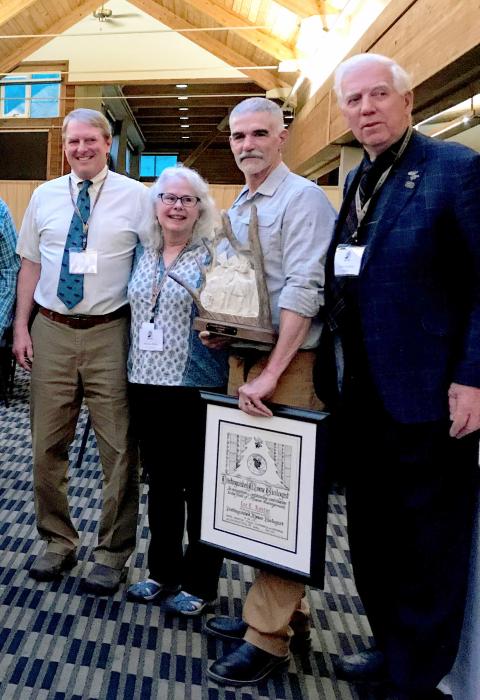
Lee Kantar ‘95, a moose biologist with the Maine Department of Inland Fisheries and Wildlife (MDIFW), was honored with the Distinguished Moose Biologist Award by his peers at the 53rd North American Moose Conference.
“Maine has the most progressive and scientific moose management program in the United States, and Lee is the engine that drives that - he is most deserving of the award,” said Pete Pekins, UNH professor of wildlife ecology and past recipient of the award.
The award was established in 1981 to honor and publicize the outstanding contribution of an individual, individuals, and/or organizations to moose management. It is not given out every year, and since its inception, recipients include those from the United States, Canada, Sweden, Finland and Norway.
Lee was recognized for his field work which includes designing, conducting, and overseeing Maine’s Moose survival study, Moose aerial surveys, moose necropsies and moose captures; his research which includes nearly a dozen published manuscripts, multiple agency reports, and scores of public presentations; and his administrative work regarding Maine’s moose management program and moose hunt.
Lee graduated from UNH in 1995 with a degree in wildlife management. He joined MDIFW in 2005 as their deer biologist, and in 2007, he volunteered to include moose management as part of his role with the department. Lee oversaw the management of moose and deer for five years before devoting all his focus on moose management in 2012.
“Lee’s work and dedication to Maine’s moose is exceptional. Maine’s moose survival study is pioneering in both its scope and numbers and has been a model for other state’s and provinces,” said MDIFW Commissioner Judy Camuso.
Maine has over 60,000 moose, the most in the lower 48 states. Moose were plentiful in Maine during the 1600s but by the early 1900's, moose populations in Maine had declined to an estimated 2,000 due to unregulated hunting, clearing forestland for farming and increased incidence of brainworm attributed rising deer populations. Since that time, increased protections, management and improved habitat have allowed the moose population in Maine to thrive.
In photo above, Lee Kantar, third from left, poses with past award recipients Pete Pekins, Kristine Rines of New Hampshire Fish and Game, and Vince Chrichton of Manitoba. Photo courtesy of MDIFW.